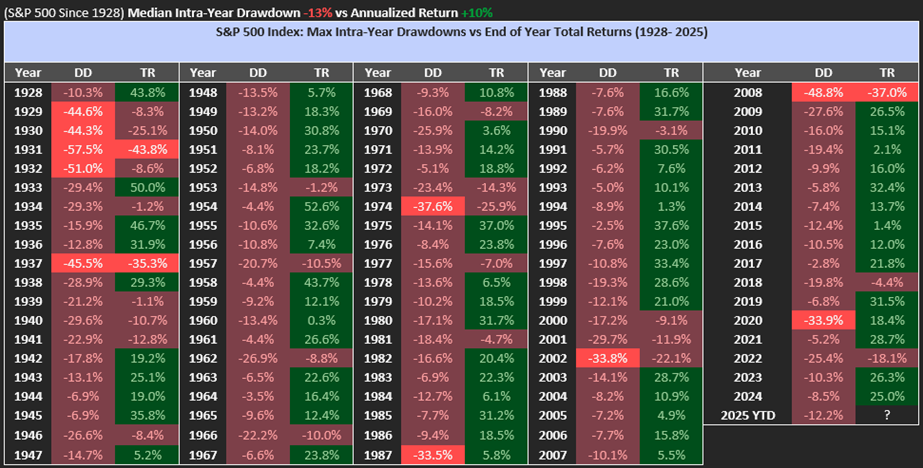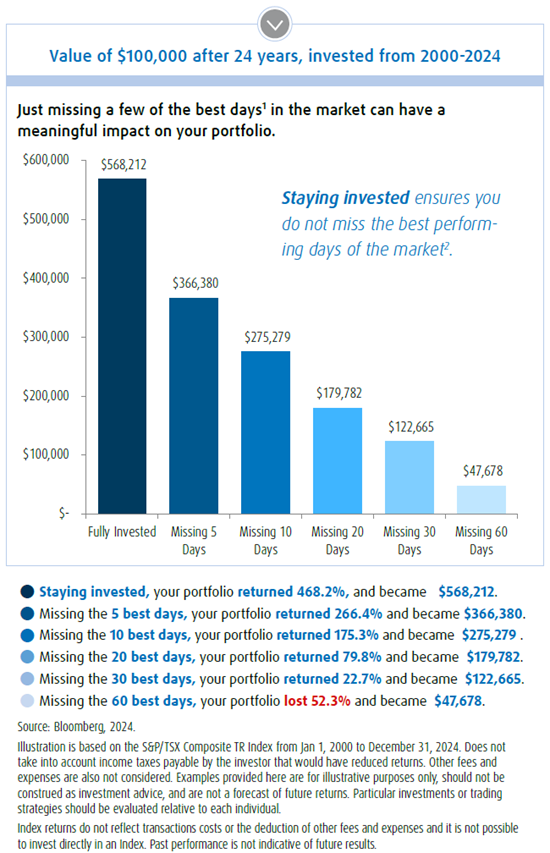Navigating Market Uncertainty
Alan Kwan - Apr 17, 2025
The markets have been on a bit of a rollercoaster lately. In just a few short days, we saw major indices drop nearly 10%, and naturally, that stirred up a lot of fear and anxiety among investors.
The markets have been on a bit of a rollercoaster lately. In just a few short days, we saw major indices drop nearly 10%, and naturally, that stirred up a lot of fear and anxiety among investors. The tipping point? On April 2nd, the U.S. announced a series of reciprocal tariffs affecting over 50 countries. As expected, markets didn’t take the news well and reacted sharply.
Key Takeaways
- While recent market volatility has caused concern, history shows that markets consistently recover from downturns with time and patience.
- The key to navigating uncertainty is staying invested in diversified, high-quality portfolios rather than reacting emotionally or trying to time the market.
- For those needing short-term cash, it's best to draw from stable assets like fixed income to avoid selling equities at a loss and disrupting long-term goals.
Looking Back to Move Forward
Edward has been in this business for over 38 years, and he's seen more than a few downturns. One key takeaway from all those years? Markets recover. Always.
Think back to March 2020, when COVID sent shock-waves around the globe. Travel stopped. Businesses shut down. Governments scrambled to respond. During that time, the S&P 500 dropped a staggering 34% in just one month. But by August of the same year, markets had already bounced back to their previous highs.
And before that, there was the financial crisis of 2008. Risky lending and failing banks—most notably Lehman Brothers—sent markets spiraling. By the time we hit the bottom in March 2009, major indices had lost over 50% from their peaks in 2007. Yet by the end of 2009, markets finished the year in positive territory.
Every market downturn is different - caused by unique events and conditions. But history shows us a clear pattern: with time and patience, markets do come back.
(See the chart below showing the biggest dips each year compared to how the market ended that same year. It’s a helpful reminder that even in volatile years, recovery is often closer than it feels.)

Questions from Our Recent Open Q&A
Earlier this month, we hosted a webinar to address questions posed by you about navigating the current market uncertainty. Here is a summary of our discussion.
Q: How will the Canadian Federal Election affect the tariffs?
This one’s easy. Since the tariff issue is coming from the U.S., Canada’s federal election won’t have much of an impact on it. We believe that whichever party is in power will need to find a way to unite and stand-up for our country. That said, don’t forget to get out and vote on April 28th – it’s still important to have your say!
Q: What is the Mah Investment Group doing in this volatile environment?
We’re staying on top of it. Our managed portfolios are constantly monitored by experienced portfolio managers who look for long-term opportunities—especially during market dips. They’re focused on quality companies that can weather uncertainty.
We continue to emphasize diversification so your investments aren’t too exposed to any one company or sector. And above all, we stick to our philosophy: it’s not about timing the market, but spending time in the market that leads to lasting results.
Q: Can markets really swing that quickly?
Absolutely. A great example happened on Monday, April 7th. At 10:00 a.m., markets were down about 5%. Ten minutes later, a fake news headline claiming a 90-day pause on tariffs started circulating. By 10:14 a.m., it was picked up on CNBC, and markets jumped up 7% in under 20 minutes! But when it turned out the news wasn’t verified, the gains disappeared just as fast.
The real announcement came two days later, on April 9th, and it did spark a meaningful recovery. This kind of movement shows why staying invested is so important. If you miss even a few good days, your long-term returns can take a real hit. We always advise making decisions with logic, not emotion.

Q: What if I need cash soon?
If you have short-term cash needs, we’ll work with you to find the best approach. Generally, we recommend limiting withdrawals during volatile periods and only taking what’s truly necessary. If your portfolio includes more stable fixed income investments, we may look at drawing from those first instead of selling stocks at a loss.
Reach out – we’re here to help you map out a withdrawal plan that protects your long-term goals.
So, What’s Next?
We’re all keeping an eye on what the U.S. will do next. The 90-day tariff pause lasts until July 8th, and there’s hope that trade negotiations will progress between now and then—especially between the U.S. and China, since neither side benefits from a drawn-out trade war.
Our BMO Chief Investment Strategist is still forecasting that the S&P 500 could hit 6,100—about 13% higher than current levels. Barring any major surprises, we’re cautiously optimistic that we’ll see a steady climb back to the highs we saw in February.
If you have questions, or just want to chat about what this all means for your personal situation, don’t hesitate to reach out. We’re always here to help you and your family stay on track with your goals – no matter what the markets are doing.